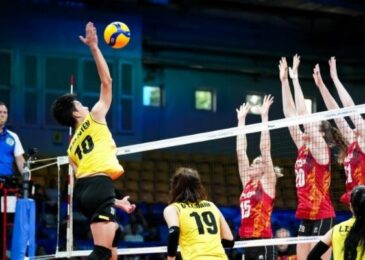Note: This article has been adapted from a story published in the Spring 2018 edition of Volleyball USA.
Athletes in volleyball, regardless of their background, often struggle with body image issues. It is crucial that everyone in the volleyball community – coaches, parents, players, and administrators – make an effort to better understand this issue and create a supportive environment. Let’s explore the impact of body image on performance and how we can promote a healthier mindset.
Bạn đang xem: Body Image and Performance in Volleyball
The Pressures of Appearance
Volleyball often attracts athletes who have a long and lean physique. This can make players who don’t naturally fit that mold feel self-conscious. Form-fitting uniforms can further amplify these insecurities. Additionally, the pursuit of winning games or securing scholarships adds pressure to athletes.
Xem thêm : Pan Am Cup Training Team Falls to Canada
It’s important to separate weight from performance. Tall and skinny may be the stereotype, but there is no “ideal” body for volleyball. Dr. Nick Galli, a psychologist from the University of Utah, emphasizes the need to focus on health behaviors that influence performance, rather than weight and appearance alone. It’s the performance that truly matters, not the numbers on a scale or the image in the mirror.
Education and Support for Coaches and Parents
Misinformation about nutrition often reaches young athletes, leading to poor fueling habits. Coaches and parents should verify their sources or consult professionals before providing nutrition advice. While coaches and parents can offer general information on healthy habits, it’s best to leave specific nutrition advice to registered dietitians.
Excessive testing, such as body composition assessments, can also create unnecessary pressure on athletes. Weigh-ins should be done in conjunction with body composition assessments, and the focus should be on performance-related goals rather than weight alone. Team weigh-ins can lead to unhealthy competition and should be avoided.
The Influence of Social Media
Xem thêm : Mens Update: Bernardinho Steps Down as Brazil Men’s National Team Coach
Traditional and social media bombard us with images of what we are supposed to look like and eat. However, these images often present a distorted reality. Photos of perfect bodies and perfect meals can be misleading and harmful. It’s important to remember that these posts represent people’s highlight reels, not their everyday lives. Comparing oneself to these idealized moments is counterproductive.
Focusing on Performance
Coaches and parents should shift the conversation towards performance. If an athlete is not performing to their potential, it’s essential to address any underlying issues. Disordered eating may be a result of external comments or stressors. By identifying the triggers, coaches and parents can provide the necessary support.
When discussing nutrition with athletes, frame it in terms of performance enhancement. Give advice on proper food choices to support training and competition. It’s crucial for athletes to view nutrition as a means to improve their overall well-being, rather than solely focusing on weight loss. A balanced and flexible diet is key to supporting training and competition demands.
Tips for a Healthy Approach
- Maintain a varied and flexible diet that supports training and competition demands.
- Follow the 80/20 rule, where 80% of food choices are made to support training and 20% are for enjoyment.
- Start the day with a nutritious breakfast and have a protein-rich lunch.
- Prioritize fresh proteins, fruits, vegetables, and eggs. Avoid processed foods found in the middle aisles of grocery stores.
FAQs
1. How can I support a volleyball player struggling with body image issues?
Be compassionate and supportive. Promote a positive body image and encourage healthy habits. Remind them that their performance matters more than their appearance.
2. Should coaches and parents provide nutrition advice to athletes?
While coaches and parents can offer general information on healthy habits, they should consult registered dietitians for specific nutrition advice.
Conclusion
Body image issues can impact the performance and well-being of volleyball players. By creating a supportive environment and focusing on performance rather than appearance, we can help athletes develop a healthier mindset. Remember, it’s not about fitting into a specific mold; it’s about nurturing your body to perform its best. For more information on promoting a positive body image in the volleyball community, visit Alpinetgheep.
Nguồn: https://alpinetgheep.com
Danh mục: Volleyball


